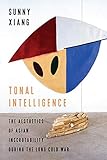Tonal Intelligence : The Aesthetics of Asian Inscrutability During the Long Cold War / Sunny Xiang.
Material type: TextSeries: Literature NowPublisher: New York, NY : Columbia University Press, [2020]Copyright date: ©2020Description: 1 online resource : 18 b&w illustrationsContent type:
TextSeries: Literature NowPublisher: New York, NY : Columbia University Press, [2020]Copyright date: ©2020Description: 1 online resource : 18 b&w illustrationsContent type: - 9780231196963
- 9780231551915
- Asian Americans -- Ethnic identity
- Asian Americans -- Race identity
- Asian-American -- Race identity
- Asians in literatura
- Asians in literature
- Asians in motion pictures
- Cold War -- Secret service
- Orientalism -- United States -- History -- 20th century
- Propaganda, American -- Asia -- History -- 20th century
- Propaganda, American -- Pacific Area -- History -- 20th century
- LITERARY CRITICISM / American / Asian American
- 303.482507309045
- DS33.4.U6 ebook
- online - DeGruyter
| Item type | Current library | Call number | URL | Status | Notes | Barcode | |
|---|---|---|---|---|---|---|---|
 eBook
eBook
|
Biblioteca "Angelicum" Pont. Univ. S.Tommaso d'Aquino Nuvola online | online - DeGruyter (Browse shelf(Opens below)) | Online access | Not for loan (Accesso limitato) | Accesso per gli utenti autorizzati / Access for authorized users | (dgr)9780231551915 |
Frontmatter -- CONTENTS -- ACKNOWLEDGMENTS -- Introduction: Hardly War, Partly History -- Chapter One The Tone of Intelligence: Unconventional Warfare and Its Archives -- Chapter Two The Tone of Rumors: Imperial Tours and Kazuo Ishiguro’s Critique of Japanese Exceptionalism -- Chapter Three The Tone of the Times: Historical Temperament in the Works of Induk Pahk and Theresa Hak Kyung Cha -- Chapter Four The Tone of Documentation: Combating the Brainwashee’s Drone in Korean War “Testimonies” and “Confessions” -- Chapter Five The Tone of Intimacy: Imperial Brotherhood and Trinh T. Minh- ha’s Cinematic Interviews -- Coda— The Tone of Commons: Solidarities Without a Solid -- NOTES -- BIBLIOGRAPHY -- INDEX
restricted access online access with authorization star
http://purl.org/coar/access_right/c_16ec
Why were U.S. intelligence organizations so preoccupied with demystifying East and Southeast Asia during the mid-twentieth century? Sunny Xiang offers a new way of understanding the American cold war in Asia by tracing aesthetic manifestations of “Oriental inscrutability” across a wide range of texts. She examines how cold war regimes of suspicious thinking produced an ambiguity between “Oriental” enemies and Asian allies, contributing to the conflict’s status as both a “real war” and a “long peace.”Xiang puts interrogation reports, policy memos, and field notes into conversation with novels, poems, documentaries, and mixed media work by artists such as Theresa Hak Kyung Cha, Kazuo Ishiguro, Ha Jin, and Trinh T. Minh-ha. She engages her archive through a reading practice centered on tone, juxtaposing Asian diasporans who appear similar in profile yet who differ in tone. Tonal Intelligence considers how the meaning of race, war, and empire came under pressure during two interlinked periods of geopolitical transition: American “nation-building” in East and Southeast Asia during the mid-twentieth century and Asian economic modernization during the late twentieth century. By reading both state records and aesthetic texts from these periods for their tone rather than their content, Xiang shows how bygone threats of Asian communism and emergent regimes of Asian capitalism have elicited distinct yet related anxieties about racial intelligibility. Featuring bold methods, unlikely archives, and acute close readings, Tonal Intelligence rethinks the marking and making of race during the long cold war.
Mode of access: Internet via World Wide Web.
In English.
Description based on online resource; title from PDF title page (publisher's Web site, viewed 25. Jun 2024)


